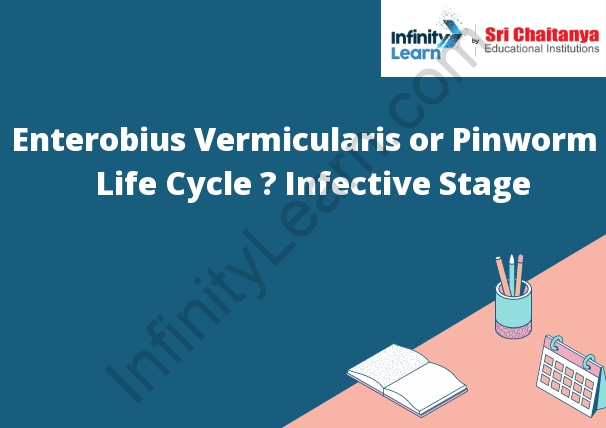Table of Contents
Pinworm Life Cycle
The pinworm life cycle is fairly simple. The eggs are deposited on the skin around the anus, and the larvae hatch and migrate up the intestine. They mature in the intestine and then the females lay eggs which are deposited on the skin around the anus. The life cycle is completed when the eggs are ingested by a human host. Enterobius Vermicularis or Pinworm Life Cycle – Infective Stage.
How to Detect Pinworms
The pinworm life cycle is a parasitic one. The adult female worm lays eggs around the anus. These eggs are then ingested, usually by children, and hatch in the small intestine. The larvae then migrate to the large intestine, mature, and lay eggs which are passed in the feces. These eggs hatch and the cycle starts over again.
Pinworms are usually detected by finding the eggs around the anus. They can also be detected by looking for the characteristic white ribbon-like worms in the feces.

Infective Stage of Enterobius Vermicularis
The infective stage of Enterobius vermicularis is the egg. The eggs are passed in the stool and can be seen with the naked eye. They are small (0.5-0.8 mm), white, and round.
The infective stage of Enterobius vermicularis occurs when the female worm lays her eggs. The eggs hatch and release tiny, worm-like larvae that can penetrate the skin. The larvae can also be ingested and enter the body through the mouth. Once inside the body, the larvae travel to the lungs and are expelled in the breath. They can then enter the digestive system and mature into adult worms.
Enterobius vermicularis, or the common pinworm, is a small, white, thread-like worm that lives in the colon and rectum of humans. The adult female pinworm lays eggs on the skin around the anus. These eggs are then transferred to the mouth, where they are swallowed. The eggs hatch in the small intestine and the young worms mature in the colon and rectum. Pinworms can cause irritation and itching around the anus.
Enterobius vermicularis, or the pinworm, is a small, white, thread-like parasite that can cause intense itching around the anus. The pinworm is the most common human parasite, and it is estimated that over half of the world’s population is infected. The pinworm is spread through contact with fecal matter, and it can be difficult to avoid coming into contact with the parasite since it is so common. The pinworm can also be spread through contact with contaminated food or water.
The pinworm undergoes a complex life cycle that involves two different hosts. The adult pinworm lives in the intestine of the human host, and the eggs are expelled in the feces. The eggs can then contaminate the environment, where they can be ingested by another host, such as a dog or a cat. The eggs hatch in the new host’s intestine and the young parasites migrate to the rectum and anus, where they mature and lay eggs. The cycle then starts over again.
Symptoms of a pinworm
The symptoms of a pinworm infection include intense itching around the anus, insomnia, and irritability. In severe cases, the infection can cause weight loss and anal bleeding. The pinworm can be diagnosed by examining a sample of the patient’s feces for the presence of eggs. The infection can be treated with medication, but it is important to clean the environment and infected person’s clothing and bedding to prevent the spread of the parasite.
A pinworm infection, also known as enterobiasis, is a type of parasitic infection caused by the small, white roundworm called Enterobius vermicularis. This worm lives in the human colon and is passed in the feces. Pinworm eggs are very resistant to environmental conditions and can survive for many months. They are also very small and can easily be swallowed or inhaled, which is how the infection is spread. Pinworm symptoms can include anal itching, restless sleep, irritability, and nausea. In severe cases, the infection can cause weight loss and malnutrition. Pinworm infections can be treated with medications such as mebendazole or albendazole, but it is important to also clean all contaminated surfaces and clothes to prevent further spread of the infection.







